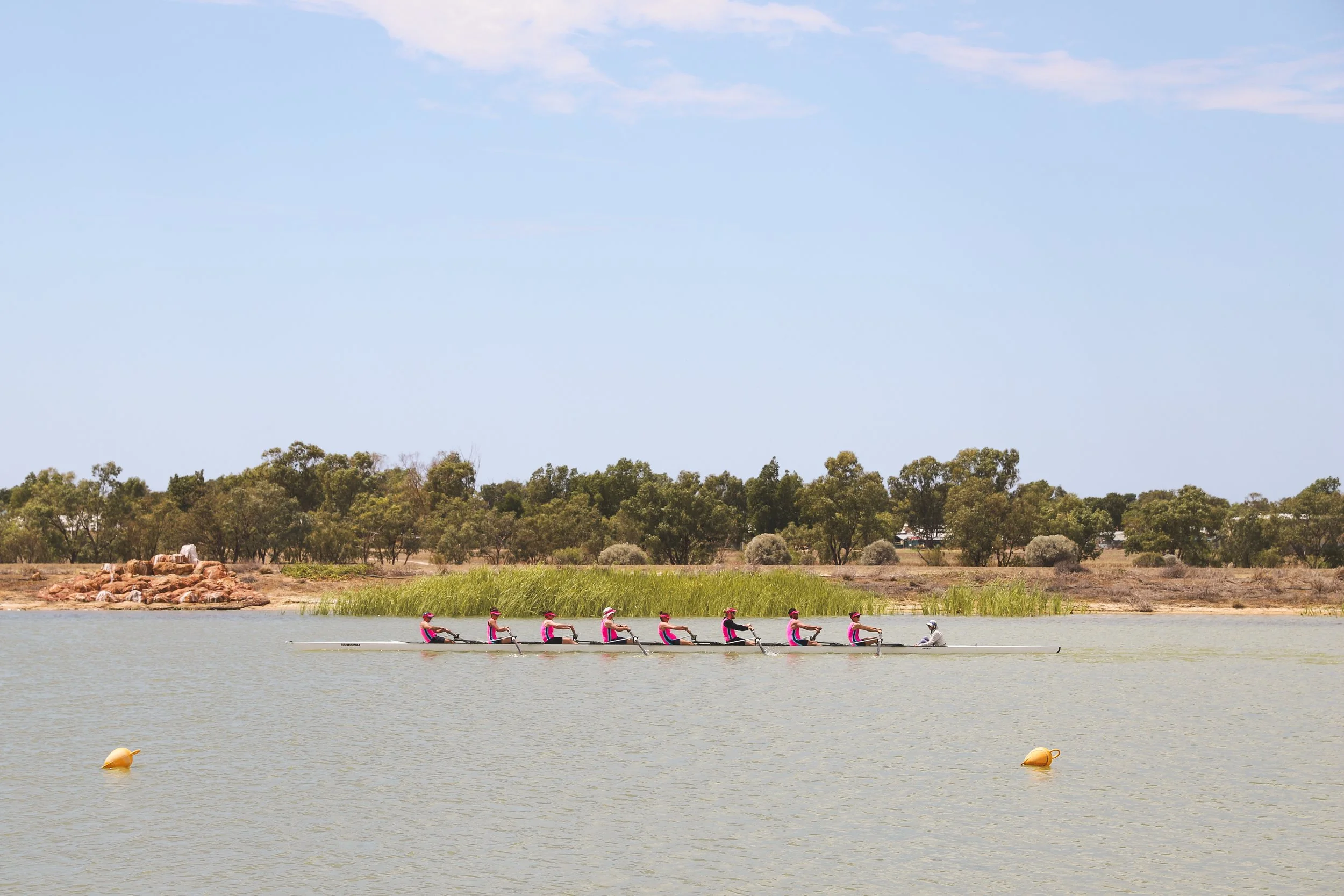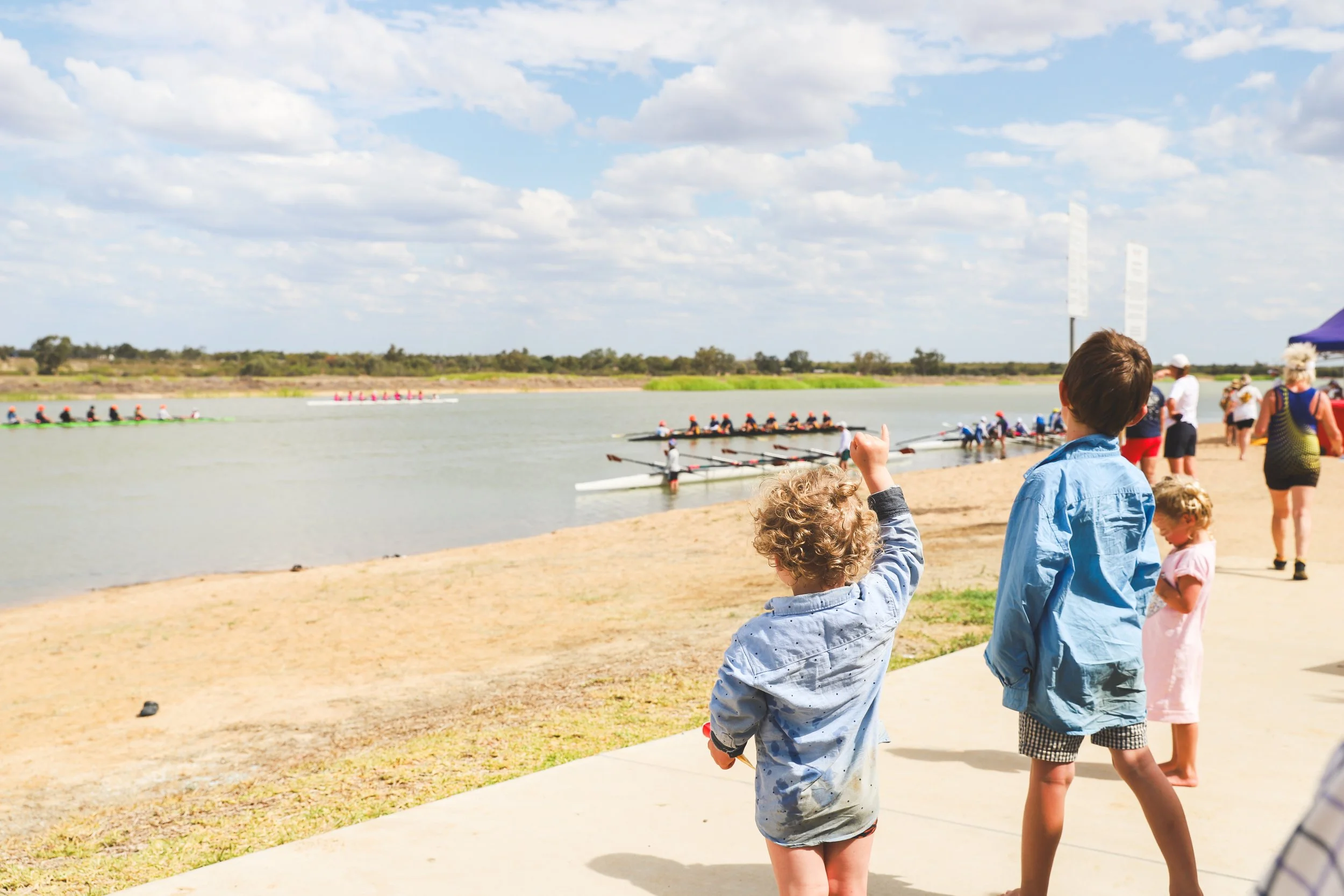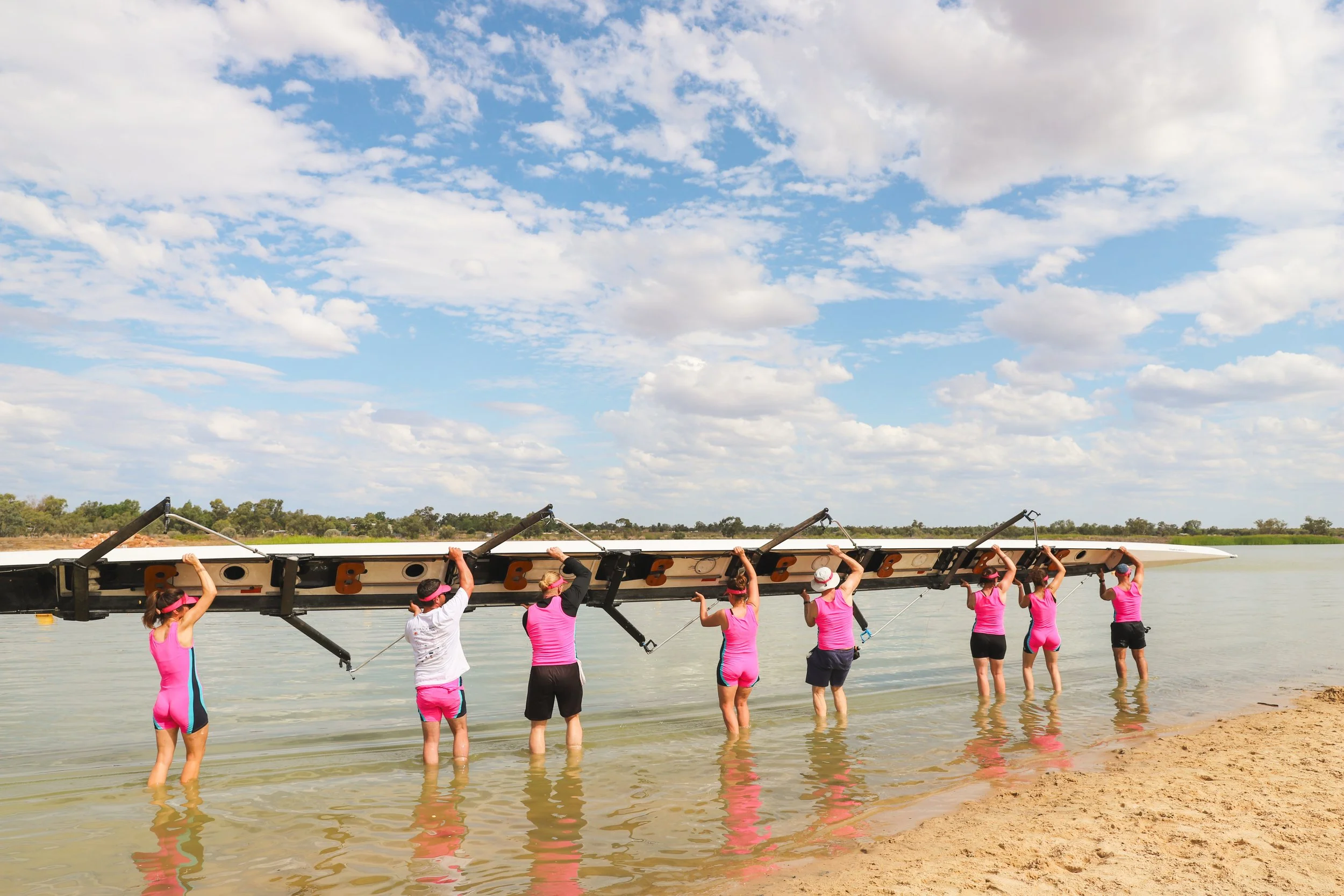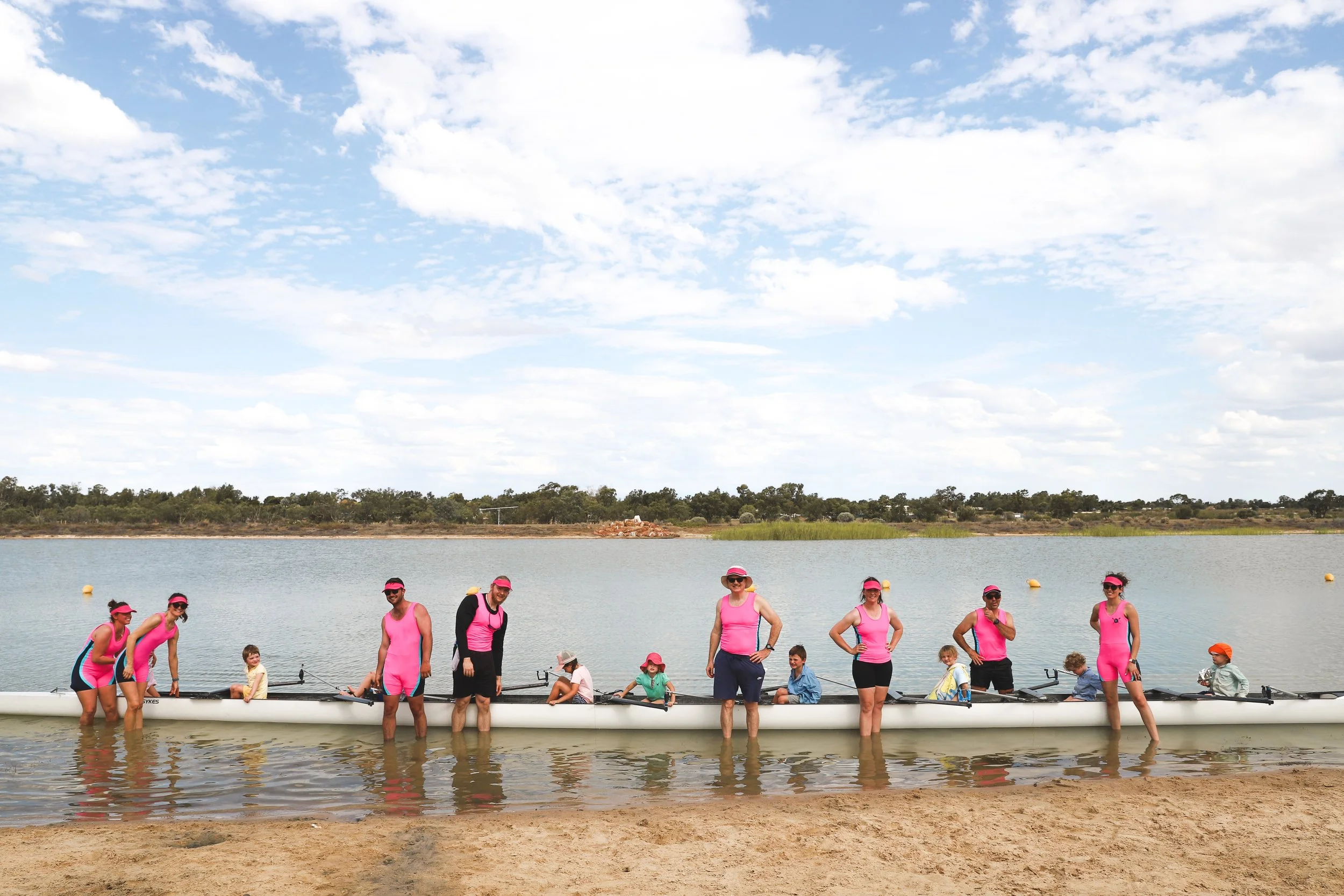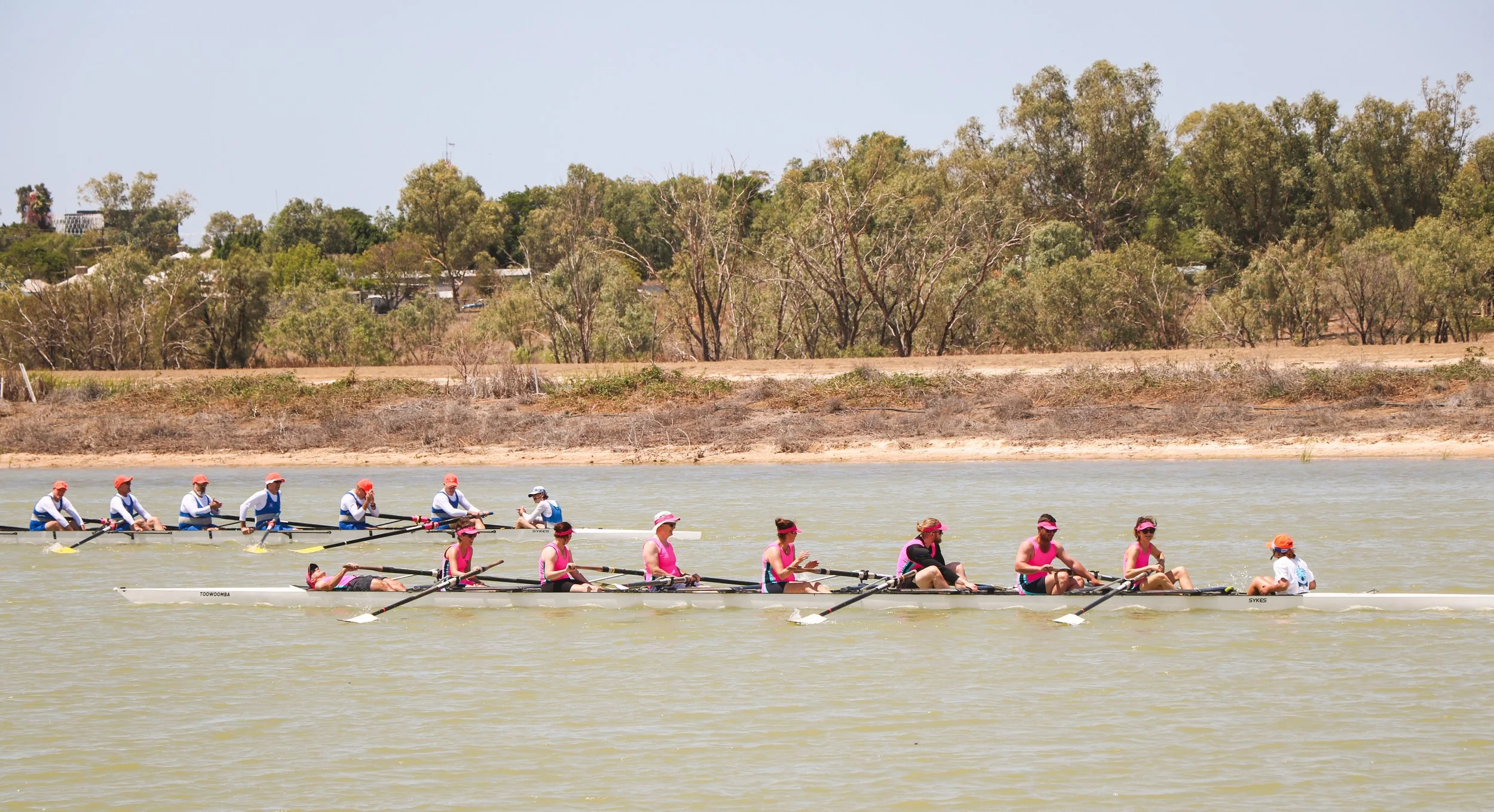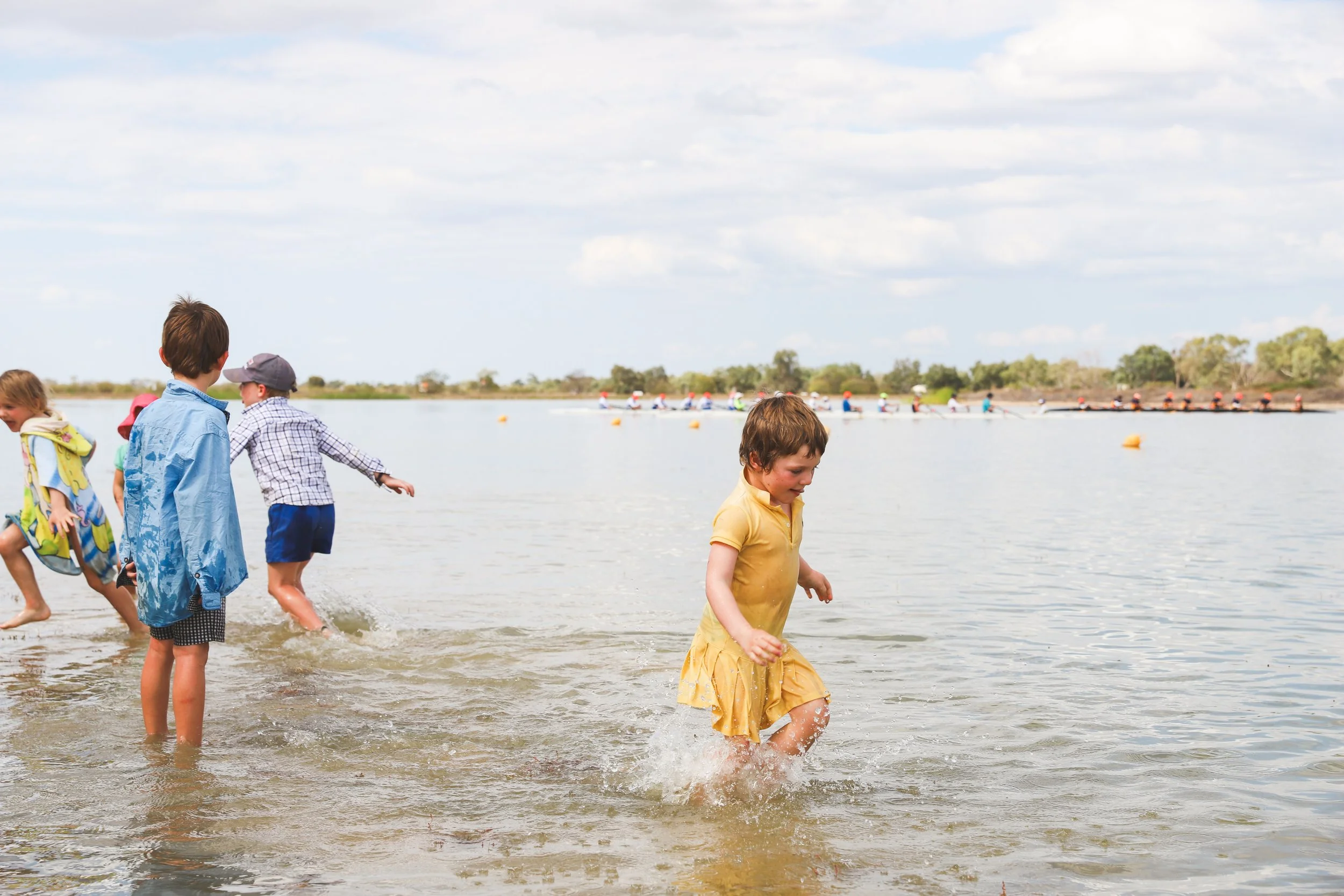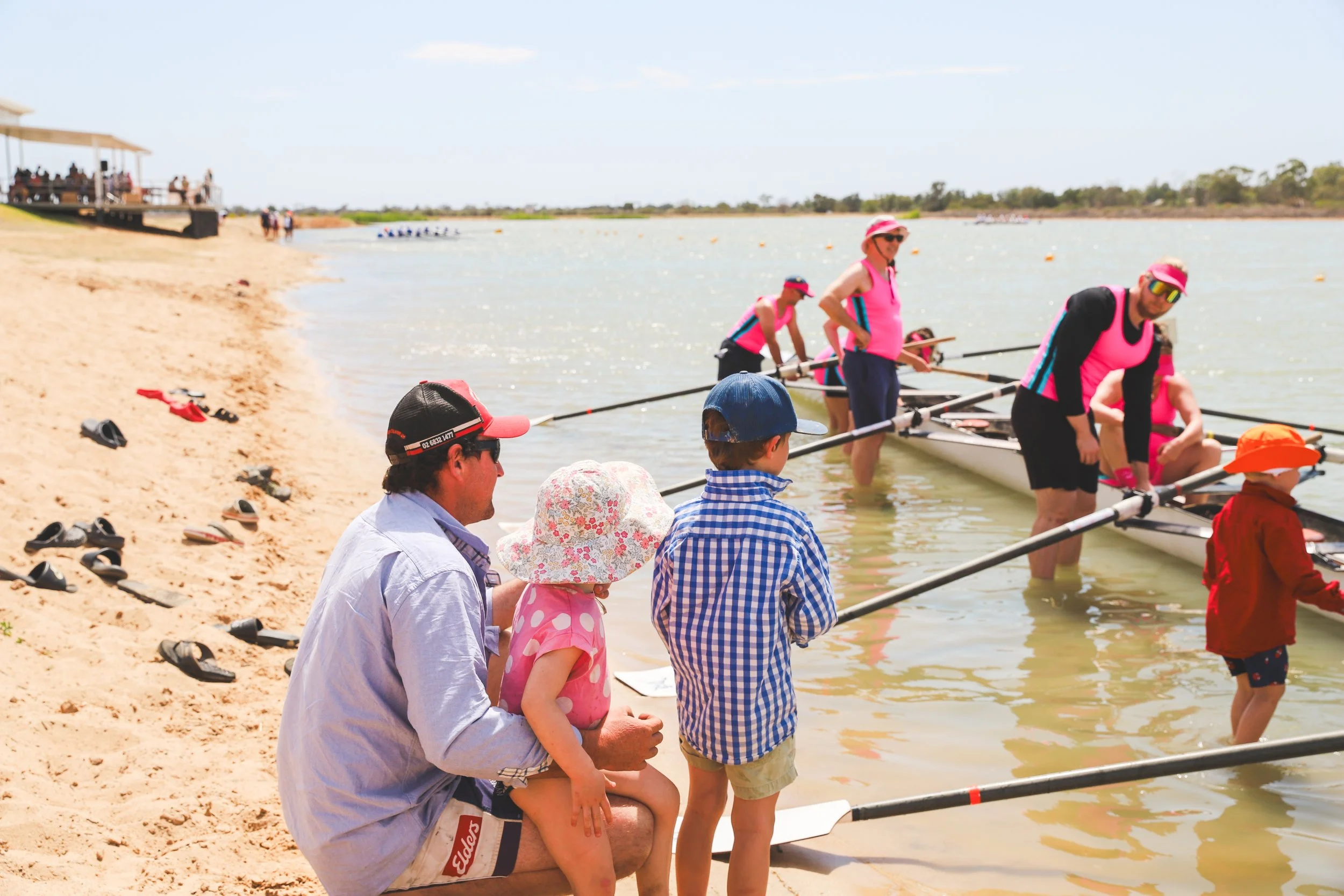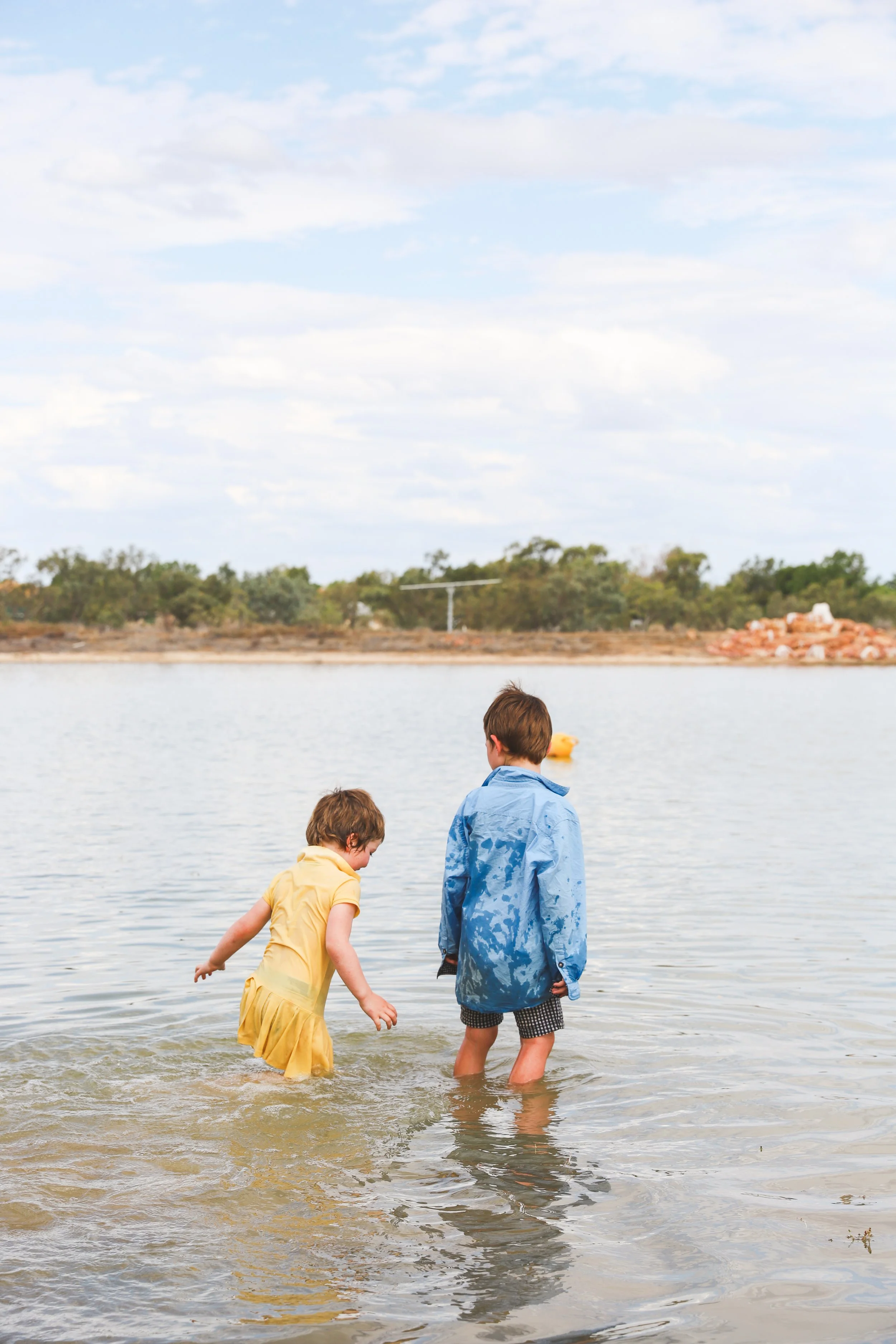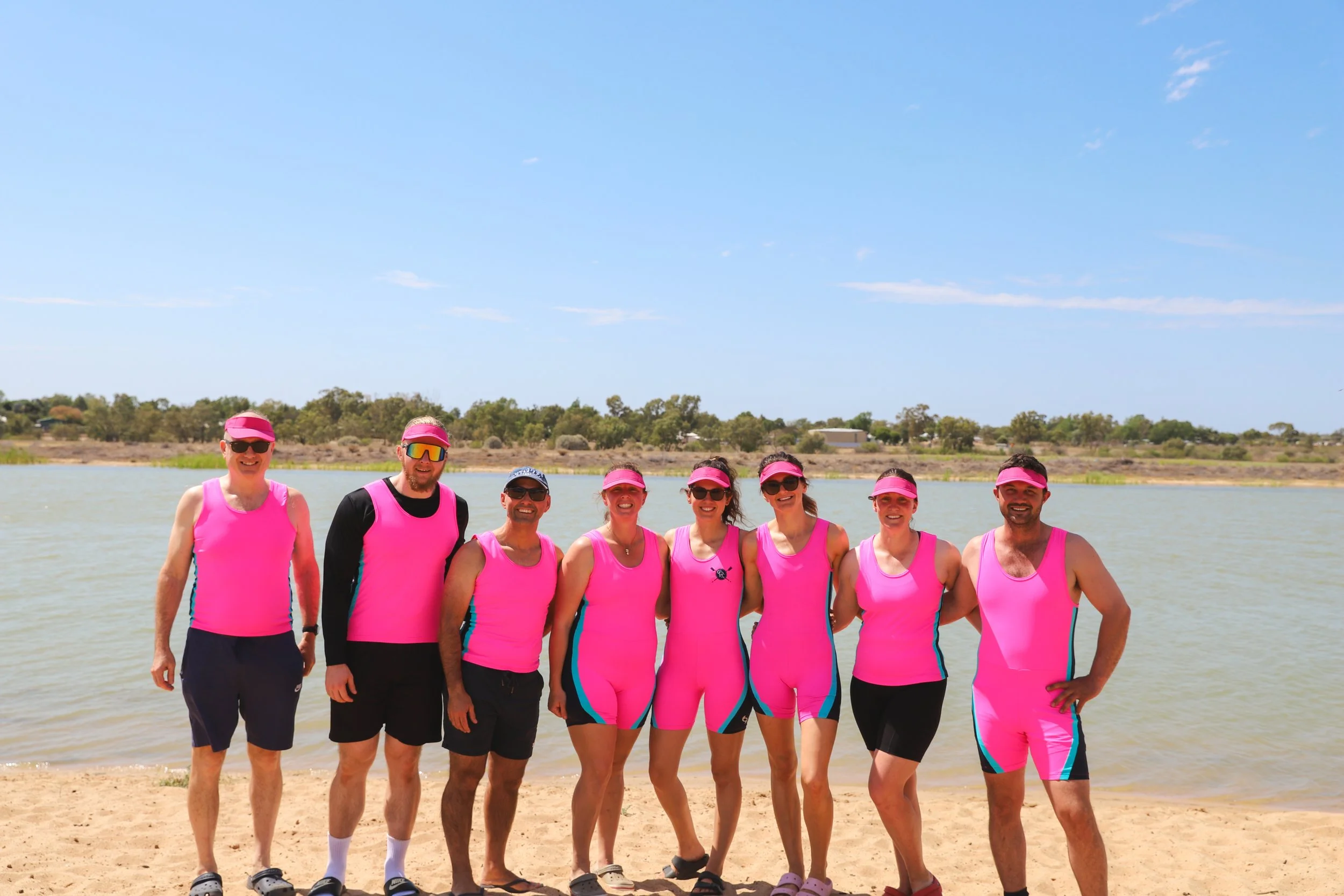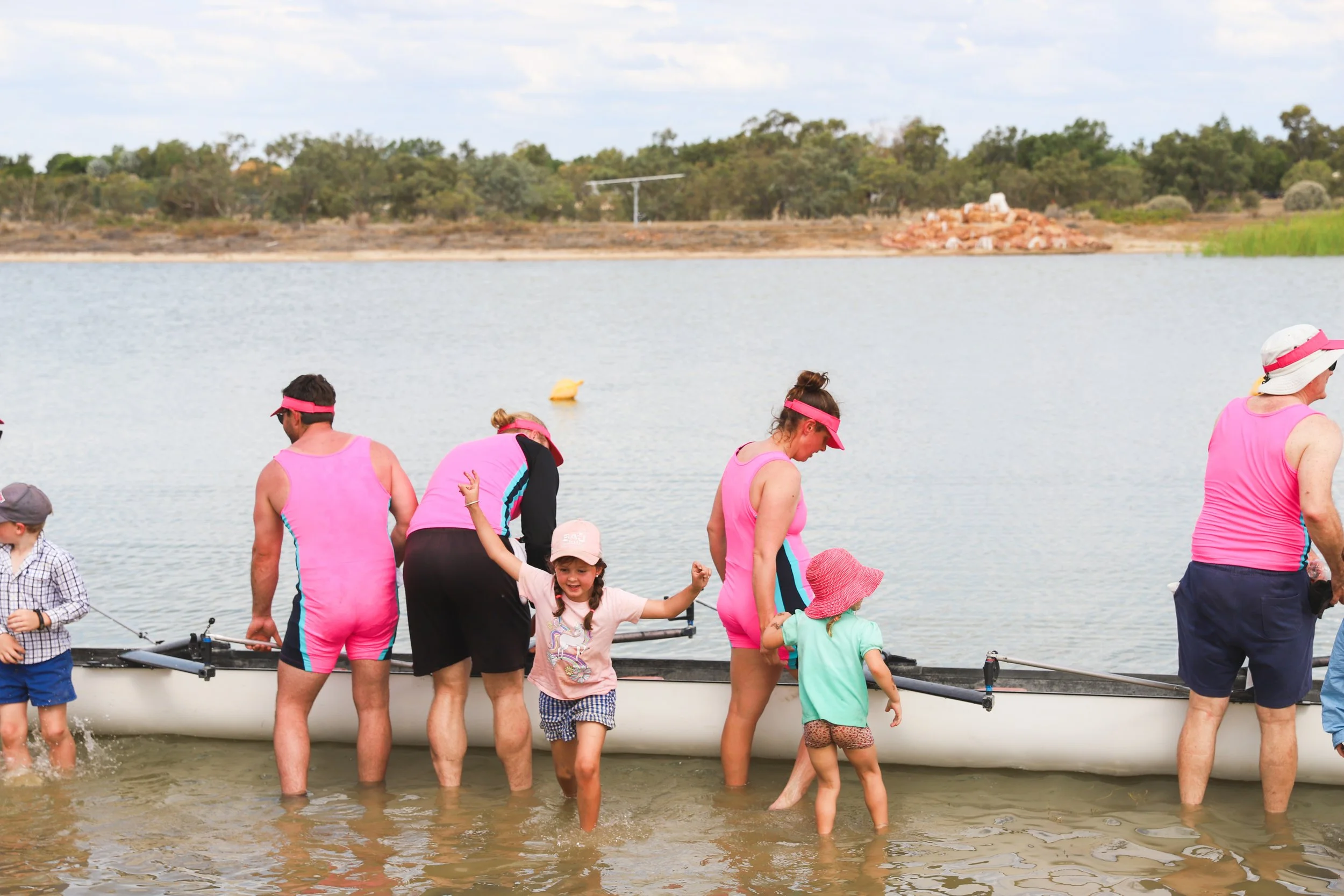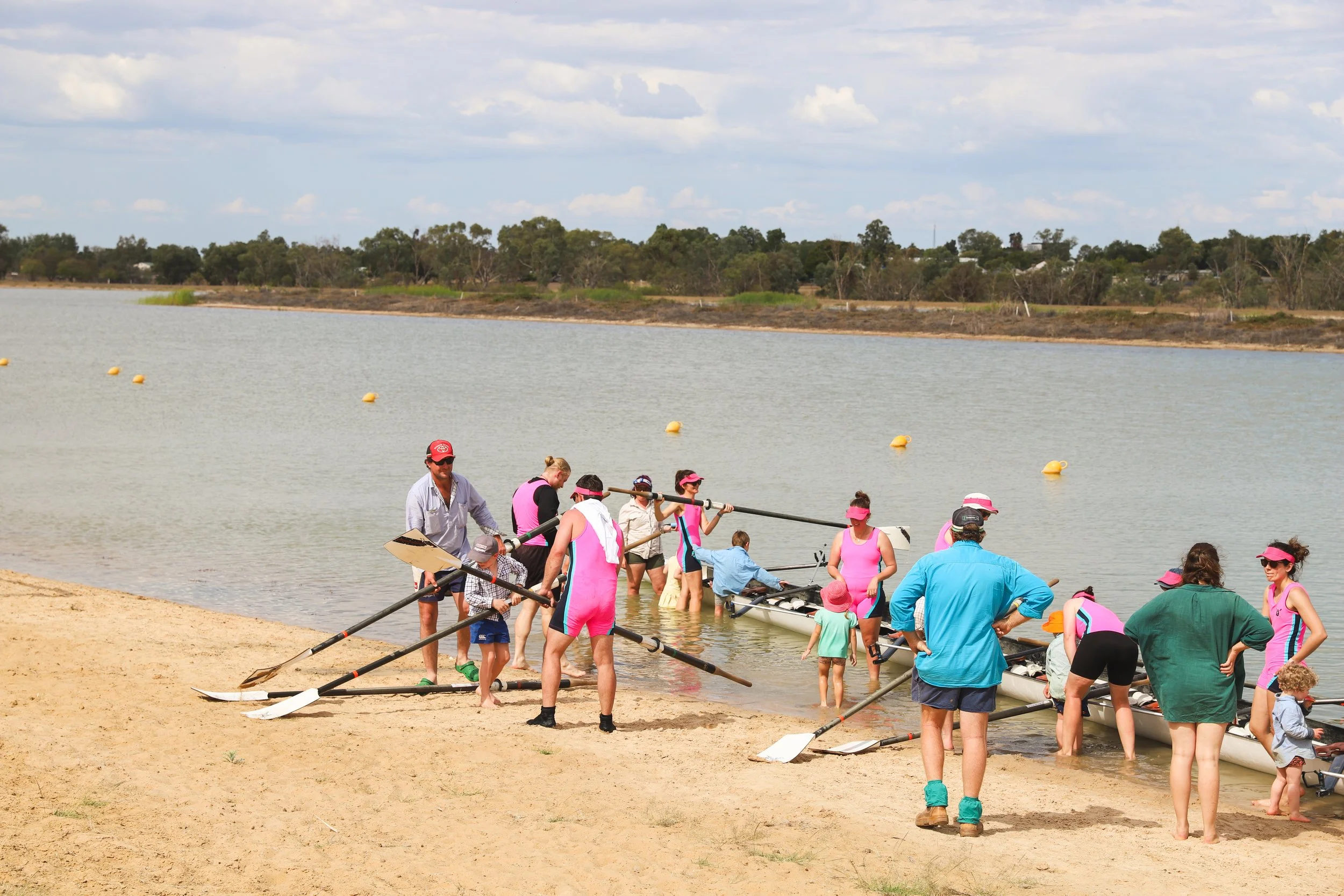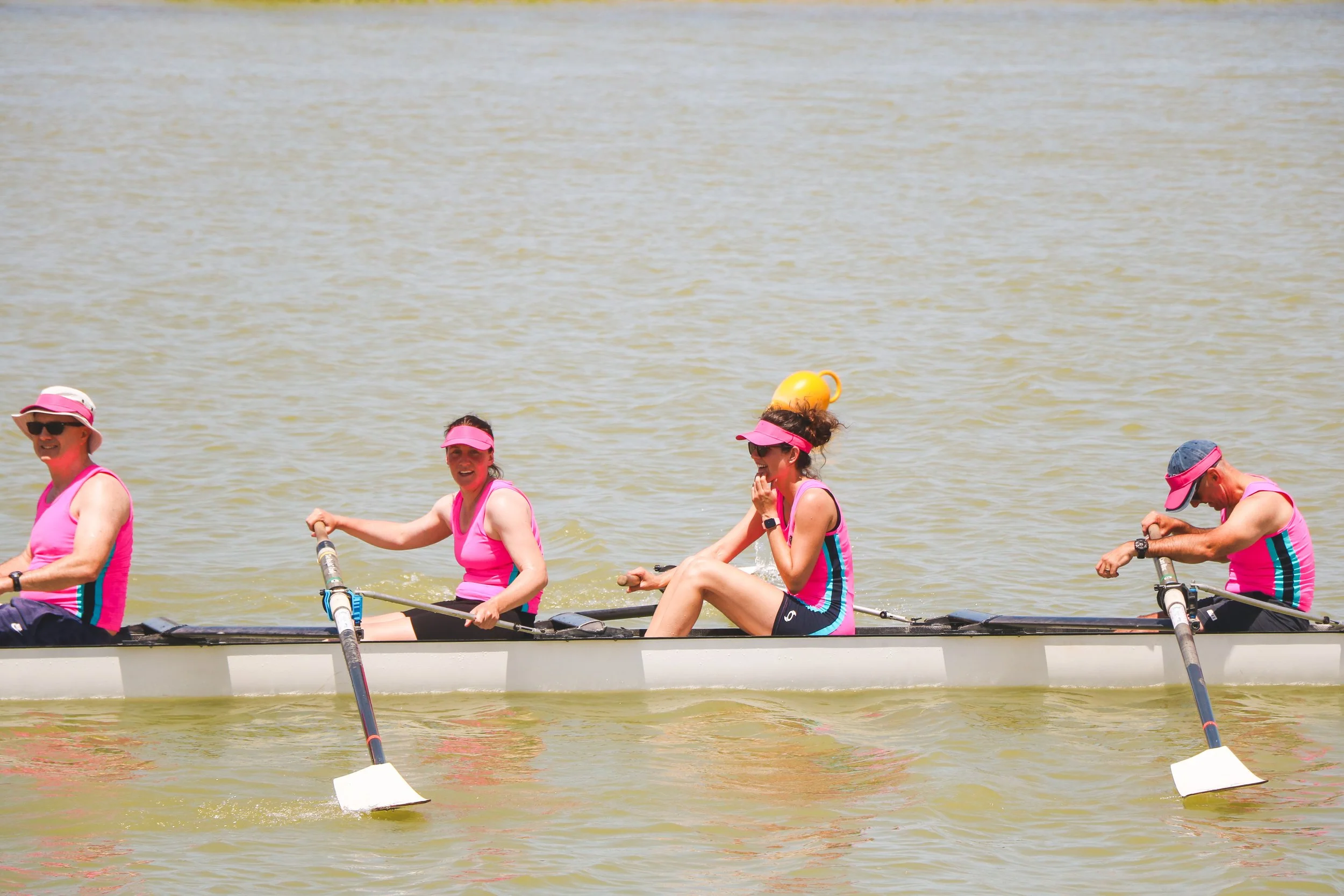Outback Rowing
Article by Andrea McKenzie Photography by Victoria Hynam
“Rowing was different. Every bit of hard work was rewarded with a noticeable improvement. I was terrified of catching a crab at race pace, a speed we only reached in our very first actual race. Yet I couldn’t wait to race, to overcome that somewhat inconsequential fear – unlike the fear of ruining your kids because you weren’t a good parent.”
It’s five weeks until race day.
Someone in Brisbane types “Cunnamulla” into Google Maps, sur- prised at how long it will take to get an VIII rowing boat out there. No one could have expected that over the next five weeks, more than twenty-five Cunnamulla locals would hit the water in an ef- fort to get a crew to the Outback Rowing Regatta in Barcaldine and Longreach, competing in the first Bush Boat division.
The first VIII of Cunnamulla – first, in this case, meaning initial, rather than a selection of the most proficient – graced the regatta in hot pink zooties. We were certainly eye-catching, but we caught a few hearts along the way too, as the rowing community gathered around our new crew and cheered us on to win the Dual and Head of the Thompson in the Bush Boat division.
Outback Rowing Australia is an organisation striving to bring row- ing and its many benefits to rural communities. In classic country style, a daisy chain of bush connections planted the seed in old girl rower Hannah McKillop. I was her exceptionally enthusiastic but completely inexperienced sidekick.
Outback Rowing Australia supplied the boat and some support along the way, we just had to find one sponsor and eight rowers. The sponsor was easy, thanks to the Paroo Shire Council. Eight rowers, however, was a challenge. This challenge proved to be the most rewarding part of the experience though, as it drew our community together.
Rowing probably conjures thoughts of discipline, tough training regiments and elite boarding schools. It turns out there are quite a few ex-rowers and ex-coxes in regional towns. As our crew pad- dled, we pondered why this sport wasn’t thriving in country towns full of disciplined students and beautiful waterways.
Not everyone remembered rowing fondly though, whether it was the high expectations or Brisbane girls having to brave winter to train in gear shared with the summer sun-kissed boys crews - pos- sibly the breeding ground for modern-day feminism?
The Cunnamulla crew culture had to be a little more creative to cope with the country chaos though, providing an opportunity to rekindle and reconnect with the sport.
Our race crew wasn’t set until the week before the regatta. And the unpredictability of farming businesses, childcare and other logis- tics meant we often started late with an ever-changing crew. We didn’t row the same crew more than once before the event and taught over fifteen people to row.
This experience was different for everyone. Some did their home- work, watching the recommended YouTube video on technique before their first go, others were gorgeously naive. That is until their first crab.
A crab, I was to learn, is what they call losing control of your oar. And can happen when you’re out of sync, turn the oar too little, turn the oar too much, dig it in too deep or for no discernable reason. The water drags the blade of the oar under with the momentum of the boat, shoving the handle uncomfortably, and rapidly, close to your face.
This proved to be a voluntary drafting gate for some of our initiates – some were spooked by their first crab and opted out, but most continued and picked up the basics fairly quickly.
We didn’t have a boat shed or proper boat trailer, so some bush mechanics improvised and our seasoned shell bumped atop truck tyres on a flat-top trailer as it travelled to the river. It took half an hour to bolt and unbolt the boat for every training session.
Once we were on the water, there were the novel questions of how to seat a boat that wasn’t full or teach new rowers (usually coached from the stroke seat without a cox) as the race crew tried to build speed to prepare for race pace. It required a completely different kind of discipline: a balance of building enthusiasm for the sport to encourage new rowers to fill the boat, but also trying to increase the intensity of training.
Anyone who is part of a rural community group understands how dynamic they need to be. These people represent the organisers, the ones who just always show up, someone applying for a boat shed grant after their second row! On the banks there were supportive partners, local businesses helping with uniforms, nannies doing extra hours and handymen tending to our well-loved boat, with running repairs as the hand-me-down lost clips, seats fell off, oar handles came out and riggers broke. Let’s face it, Outback Rowing Australia weren’t sending out their best boat to an unknown crew whose record was yet to be proven. But we grew fairly attached to our old faithful ‘Toowoomba’.
While seven Cunnamulla locals represented the club at the regatta, all twenty-five rowers deserve their share of our haphazard glory.
Nurses Josh and Olivia, and youth worker Jarib joined the crew several times as diligent students of the sport, their newness contributing minimal drag. Grace and Rosie spent more time talking than rowing, but their commitment and reasonable natural timing made up critical numbers to get the boat on the water – including making up a crew of only four very determined country women [rowing purists cover your ears] who launched the unwieldy VIII on their own.
Future hopeful George graced the vessel, continuing to inspire us with his proficiency as he works for a place in the first VIII at school next year. Coco, Lauren and Kate joined late in the piece, bravely facing increasing pace and some solid crabs to staunchly finish their first, and only, rows. Lauren’s sports star daughters might sub out mum in the future and Coco happily returned to the all-important nanny crew, juggling bank- bound progeny while the parents boated.
Ex-coxes Nick, Tom and Lachie joined the mostly coxless crew, this time with oars in hand. Sam brought the power in his maiden voyage, finesse is apparently still in the mail. Husbands Tony and Bill filled the boat to make up numbers intermittently, but both preferred to let their superstar better halves deservedly take the spotlight. School days potential Sarah reconnected with a sport that pegged her unwillingly as a prodigy, finding it anew with the performance pressure removed.
The race crew was captained, coached and coordinated by our stroke seat Hannah, as she walked a graceful tightrope to cherish the congenial vibe, unless ordering the crew to “sit the boat up!”. Hannah last rowed seventeen years ago in her school days, trudging hundreds of meters into a droughted lake to cart the boat to water. She sin- gle-handedly brought the passion that landed the boat in Cunnamulla in the first place and led the charge to see it floated in Barcaldine.
Our seventh seat was occupied by Al, the most casual gun you’d ever meet. A handful of rows brushed off the rust and the local helicopter heart-throb was all in for a trip to join a hundred or so boomers for the regatta. Aside from the rizz, he certainly brought some power to the crew.
Rowing bloodline Fran filled our six seats. A previous erg champ, she lit up the boat with enthusiasm and pace. She rows as fast as she drives and brought the same energy she has for nursing, farming, cooking, business ownership and family commitments. Fran was the doer of the crew.
A last-minute selection saw Ben in five seat. Best mates with an Australian men’s VIII rower and coxing experience, he brought a determination to make his two practice rows count and walk the talk. Also the fastest reverser ever seen, he should have a natural aptitude for going backwards quickly.
Two ring-ins also joined the crew to fill the vacant seat, with thirty-three years between rows proving no issue for Andrew and a more recent brush with rowing for Pierce sparking hopes for an Emerald crew next year.
Three seat was claimed by boat host Amy, a brief sculling career was all she needed to take up a sweep oar like a pro. Doggedly committed, Amy blended in well with the more experienced rowers. She also brings people together wherever she goes, naturally fostering the community spirit while more than pulling her weight.
I gripped the oar in two seat, having driven over two-thousand kilometres for ten train- ing sessions, and in between panic practicing with a pool noodle on a broom handle, before my first-ever race at the Outback Regatta. My job was to keep up and not crab, mission accomplished.
And bow seat Dave, surfboat rower and backseat coach, gave his all, including camping under a tree to make it in time and copping a speeding fine despite being the slowest driver in the crew. Committing to his new posting in Cunnamulla, he raised hopes of making waves on the Warrego with a surfboat down the track.
This motley crew realised or remembered the beautiful finesse of traditional rowing, but the waters of gratification ran deeper for the Cunnamulla rowers. It was hard. I don’t want to dismiss that, because it was also what made it feel so good.
I am a mother of two little kids and many parents will know the monotony of the early years. Walking through each day without feeling like you’ve moved anywhere at all. It doesn’t matter how much you clean, tidy, cook, wash, disarm angry toddlers or negoti- ate hostage-style for carrots to be eaten in exchange for chocolates or screen time, it all seems to look the same at the end of the day.
I’ve found myself almost five years into motherhood with a lot of blurred memories, lessons I’ve tried to teach a thousand times and only the hope that I’ve instilled some values into my children, with the proof pudding still years away. I’ve yearned for my career to fill the gaping hole of daily achievement and judged myself for not carting babies to the yards in forty-five-degree heat, or resenting the preparatory marathon required to get kids into the paddock only to head home twenty minutes into the muster because someone is sick, wet, hungry or tired.
Rowing was different. Every bit of hard work was rewarded with a noticeable improvement. I was terrified of catching a crab at race pace, a speed we only reached in our very first actual race. Yet I couldn’t wait to race, to overcome that somewhat inconsequential fear – unlike the fear of ruining your kids because you weren’t a good parent.
It was also the first time I was motivated to exercise, my abs still two centimetres apart since my last pregnancy almost three years ago. I was mostly driven by a desperation to not add ‘most unfit’ to my existing title of most inexperienced. A three-hundred-and- sixty kilometre round trip for training and I relished every moment of it. I didn’t just lean into rowing, I leant on it – resting my worries and fatigue on the oar so that each stroke could chip away at them. It brought me back to life, transforming me from the stereotypical millennial mum on the brink into a veritable zen monk rising from a meditation.
I wasn’t the only one. Many of the other rowers echoed my exuberance, as rural mothers deserted from sport, connection and, at times, even the feeling of self-sovereignty. It was beautiful to see the experienced women glow. So often the women are the ring-ins in the bush, having moved to their husband’s farm. Seeing them take the reins is a reminder of how many capable, passionate and talented women are hiding out here, often swamped by the enormous juggle, limited professional alternatives to agriculture and childcare hurdles.
It isn’t all about the women either. It provided a chance for every- one to socialise outside of the classic country BBQ gender draft – a refreshing change since it didn’t come with a hangover. It felt good and was good for us – although probably equalised slightly by the pub feed that seemed to follow most Friday afternoon rows. As something new, it also came without any preconceptions or cliques, bringing a new and diverse group of people together, in and out of towners alike.
Day one of the regatta saw us question if our very casual seven seat, Al would actually turn up, only to see his helicopter fly in an hour
before the boats hit the water. He could be seen leaving the regatta in his chopper, conspicuous in pink from two-hundred feet, headed to the Flyers Ball in Longreach. It’s possible he wore the same zoo- tie that night as he was collected by his teammates the following morning unmissable in hot pink, his canvas bag over one shoulder, in the main street of town.
The Outback Regatta is a masters rowing event, which we uncom- fortably found out included us, as over the spritely twenty-seven- year-old cut-off. We did however lower the median age consider- ably, particularly given our crew of eight was outnumbered by the ten children who cheered us from the shore.
It was amazing to see the breadth of experience in the rest of the rowing crews, from people starting their rowing careers in their fifties to those still rowing from their school days, with the oldest rower in his eighties.
Most of the crews came from bigger cities with a side plot of the event connecting the city rowers with their food and fibre pro- ducing country cousins. Crews like Mossman and Drummoyne travelled over seventeen hundred kilometres from Sydney to the regatta, returning home to quickly pick up the phone and offer us advice and pre-loved shells to bolster our burgeoning bush club. Orphan crews were formed with rowers from the north of Queensland teaming up with Tasmanians, before segregating once again for a state-of-origin sprint.
There were plenty of well-organised social engagements over the weekend as well, providing a chance for us to de-zootie and meet our collegial competitors. I certainly didn’t travel to Longreach expecting to talk to a mining executive about the opportunities for agriculture to contribute to climate sustainability.
The other bush boats included a bolstered crew of Longreach stalwarts, shiny new Chinchilla gym junkies with only two experienced rowers in their crew and a group of geographically spread out, sentimental Barcoo old boys who challenged us for best dressed.
Rowing was the vessel, but ultimately, the heart of this story was people who embody our social nature as humans – the community spirit country towns are famous for.
If you’re interested in seeing more of our work - we hope you’ll consider subscribing to our physical paper here.
